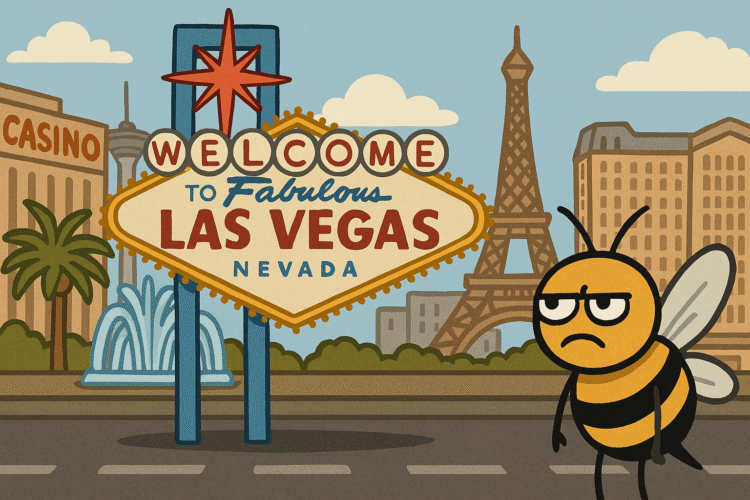
The neon still hums, the fountains still dance, and somewhere a drunk accountant from Omaha is still insisting that blackjack is “all about strategy.” On the surface, Las Vegas hasn’t changed. But beneath the flicker of LED desert opulence, the numbers are telling a story that the slot machines won’t: fewer people are coming.
Vegas, the city built on the illusion that you can always buy another life if you can scrape together enough chips, is starting to look like the boyfriend who was hot in his twenties but is now relying entirely on filters and nostalgia to keep you interested.
The tourism drop is more than a blip. This isn’t just a slow Monday at the buffet. It’s the kind of downturn that makes casino executives sweat into their tailored vests and wonder if maybe—just maybe—charging $26 for a watered-down mojito wasn’t the genius business model they thought it was.
And sure, everyone wants to blame “the economy.” That’s the easy answer. Inflation, high interest rates, global instability, the fact that eggs now cost more than a hand of poker. But Vegas has always been recession-proof—or at least, it was. People used to come here in hard times because it offered something the rest of the country didn’t: hope, distraction, and the chance to lose your rent money in air-conditioned comfort while a cocktail waitress in a feathered headdress called you “hon.”
Now? Hope has been replaced with QR codes. You order your own drinks from a screen, the shows are priced like down payments, and the only feathered headdresses are in Instagram reels you watched before booking your budget Spirit flight. The magic is thinning, and people are noticing.
Of course, this isn’t just about Vegas. The city is a fever dream version of America’s economy—when Vegas coughs, the rest of the country checks for symptoms. The tourism decline feels like a quiet, glitter-covered referendum on how people are spending their money, their time, and their capacity to pretend things are fine. If fewer people are willing to throw a paycheck at the Bellagio fountains, maybe they’re not throwing it anywhere else, either.
It’s also a reminder that Las Vegas has always been a mirror, reflecting exactly what America wants to believe about itself. In the post-war years, it was abundance. In the ’80s, it was excess. In the early 2000s, it was excess with bottle service. Now? The mirror is cracked, and we’re seeing the reflection for what it is: tired, over-leveraged, and trying to relive the old days on store-brand energy drinks.
The irony is that Vegas will survive. It always does. It will shapeshift into whatever we need it to be—whether that’s a family-friendly “mini Dubai” complete with overpriced aquarium tickets, or a dystopian influencer set where people livestream themselves losing money for virtual tips. The city doesn’t care who you are, where you came from, or why you’re there. It only cares that you swipe.
But the drop in bodies on the Strip means one thing: people are starting to wonder if the fantasy is worth the airfare. It’s not that Americans have lost their taste for distraction—we still love a good escape—it’s that we’re looking for it in smaller, cheaper doses. And in a country where everything is starting to feel like a gamble, maybe the last thing we want is to be reminded of the odds.
Final Thought:
When Vegas starts losing its players, it’s not just a casino problem—it’s a culture problem. The house always wins, but if the players stop showing up, even the house has to admit the party’s over. And maybe—just maybe—it’s time to stop doubling down on the illusion and start building something worth coming back for.